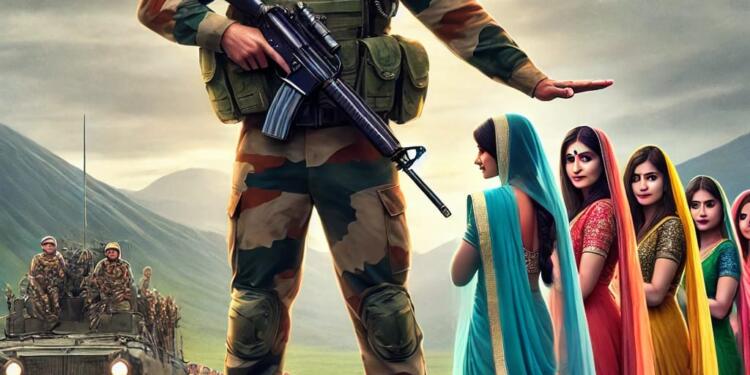The assault on a 22 Sikh Regiment Captain and his bride-to-be marked the unrelenting commitment of the Indian Army in standing behind its personnel whether on or off duty. This turn of events took a decisive course only when COAS General Upendra Dwivedi directly intervened, pushing Defense Minister Rajnath Singh to act swiftly and decisively. Even when local authorities dilly-dallied, the prompt mobilization of the Army showed a commitment that speaks volumes to history when the Indian military acted, as in the case of a significant event in 1959 in Amritsar. Maj. Gen. Dhruv C. Katoch has given the reference in the magazine “Salute to the Indian Soldier.”
A Fatal Night in 1959
In the historic landscape of Amritsar, the Indian Army faced an egregious violation of its core principles—woman’s dignity and respect. On a mundane evening, Army officers and their families convened at the local railway station to bid farewell to a departing officer. What began as a peaceful gathering deteriorated swiftly when drunken local hooligans initiated vulgar harassment towards the officers’ wives.
Initially, the officers decided to ignore those provocations, as is rightly expected from military men and women. However, it was not long before when the harassers came toward the women with evident designs of committing physical offense before the officers were compelled to intervene. Alas, for the assailants. They soon realized that getting at disciplined soldiers was not a bright idea after all. The hoodlums ran into a nearby cinema hall where they believed a crowd would protect them.
History repeats itself when we fail to learn.
In light of recent events in Odisha, it’s clear that the fight for dignity and respect continues !!🙌 pic.twitter.com/7mikYFwOgp
— Simrat Sahota (@iamsimratsahota) September 18, 2024
The Army’s Response
When the harassment was reported, Colonel Jyoti Mohan Sen, the Commanding Officer of the local unit, was inflamed with indignation. His own officers’ families had been subjected to criminal aggression, and he knew that something had to be done immediately, regardless of the political fallout that this would entail—one of the aggressors was the son of Pratap Singh Kairon, then Chief Minister of Punjab.
Unperturbed by the political fallout, Colonel Sen directed his men to surround the cinema hall. Soldiers went into the crowded hall, pinpointing the culprits and dragging them out into the daylight of justice. In a dramatic exhibition of military discipline and morality, the attackers—among them Kairon’s son—were divested of their clothes and marched naked through the streets of Amritsar. It was not a punishment measure; rather, it was declaring that political influence would protect those who disrespected women.
Detained overnight in the Army cantonment, the culprits faced angry demands by Chief Minister Kairon, who also came in to plead on behalf of the detainees but was asked to walk over to enter the cantonment by the Armymen, with no regard that he happened to be its Chief.
In a meeting with Colonel Sen, Kairon insisted on the immediate release of his son. Nevertheless, Sen stood firm. Only after delivering a stern warning against further misconduct did he release the goons, leaving them stripped of their arrogance but still stinging from the humiliation of their actions.
Also read: Civilian Cuffs: How an Indian Soldier Can be Arrested?
The Aftermath: Upholding Dignity
The incident became a national controversy when Kairon approached Prime Minister Nehru to demand punitive action against Colonel Sen and his men. He called Army Chief Gen. Kodandera Subayya Thimmayya, who, after being briefed, gave an unyielding reply: “If we cannot defend the honor of our women, how can you expect us to defend the honor of our country?”
“This powerful declaration not only silenced Nehru but also crystallized the Army’s ethos regarding women’s dignity—it was non-negotiable.”.
No punitive actions were taken against Colonel Sen or the soldiers under his command, marking a pivotal moment that reinforced the Indian Army’s moral authority. General Thimmayya’s words have since transformed into a rallying cry for the Armed Forces—a reflection of the consistent principle that protecting the dignity of women is as paramount as defending the nation itself.
A Continuing Legacy
Fast forward to today, and the scenario in Odisha only represents a rich legacy left in the hands of history. The interference by Indian Army Chief Gen. Upendra Dwivedi confirmed that the commitment from the Army side is far beyond the battle field—it’s extended into the personal life too. Such unbreakable loyalty showcased in this new episode resonates not only with the historical showdown in 1959 but also cements the role of the Army as the protector of soldiers and their families. This recent episode is a badge of honor to the Indian Army’s relentless pursuit of justice, dignity, and honor. It upholds an age-old tradition of steadfastness against any affront towards those who serve in the armed forces, bringing respect and protection for the women within the fabric of military values. As the Army continues to stand ready to protect the country and itself, it is clear that these tales of heroism and loyalty will echo down the corridors of time.




















